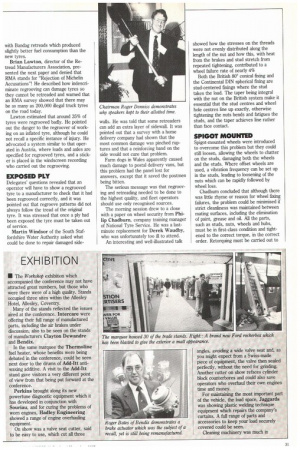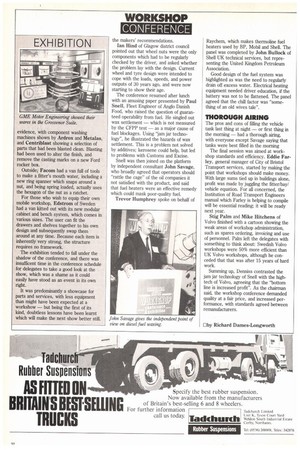EXHIBITION
Page 33

Page 34

If you've noticed an error in this article please click here to report it so we can fix it.
• The Workshop exhibition which accompanied the conference may not have attracted great numbers, but those who were there were of a high quality. Stands occupied three sites within the Allesley Hotel, Allesley, Coventry.
Many of the stands reflected the issues aired at the conference. Intercare were offering their full range of manufactured parts, including the air brakes under discussion, also to be seen on the stands of manufacturers Clayton Dewandre and Bendix.
In the same marquee the Thermoline fuel heater, whose benefits were being debated in the conference, could be seen next door to the drums of Add-Itt antiwaxing additive. A visit to the Add-Itt stand gave visitors a very different point of view from that being put forward at the conference.
Perkins brought along its new powertune diagnostic equipment which it has developed in conjunction with Souriau, and for curing the problems of worn engines, Hadley Engineering showed a range of engine overhauling equipment.
On show was a valve seat cutter, said to be easy to use, which cut all three angles, avoiding a wide valve seat and, as you might expect from a Swiss-made piece of equipment, the valve then sealed perfectly, without the need for grinding. Another cutter on show refaces cylinder block counterbores and could also save operators who overhaul their own engines time and money.
For maintaining the most important part of the vehicle, the load space, Jaggards was showing plastic welding technique equipment which repairs the company's curtains. A full range of parts and accessories to keep your load securely covered could be seen.
Cleaning machinery was much in evidence, with component washing machines shown by Ardrox and Metalas, and Centriblast showing a selection of parts that had been blasted clean. Blasting had been used to alter the finish, and remove the casting marks on a new Ford rocker box.
Outside; Facom had a van full of tools to make a fitter's mouth water, including a new ring spanner which snaps around a nut, and being spring loaded, actually uses the hexagon of the nut as a ratchet.
For those who wish to equip their own mobile workshop, Edstrom of Sweden had a van Ititted out with its new modular cabinet and bench system, which comes in various sizes. The user can fit the drawers and shelves together to his own design and subsequently swap them around at any time. Because each item is inherently very strong, the structure requires no framework.
The exhibition tended to fall under the shadow of the conference, and there was insufficent time in the conference schedule for delegates to take a good look at the show, which was a shame as it could easily have stood as an event in its own right.
It was predominantly a showcase for parts and services, with less equipment than might have been expected at a workshow — but being the first of its kind, doubtless lessons have been learnt which will make the next show better still. the makers' recommendations.
Ian Hind of Glagow district council pointed out that wheel nuts were the only components which had to be regularly checked by the driver, and asked whether the problem lay with the design. Current wheel and tyre design were intended to cope with the loads, speeds, and power Outputs of 30 years ago, and were now starting to show their age.
The conference resumed after lunch with an amusing paper presented by Paul Snell, Fleet Engineer of Anglo Danish Food, who raised the question of guaranteed operability from fuel. He singled out wax settlement — which is not measured by the CFPP test — as a major cause of fuel blockages. Using "jam jar technology", he illustrated the hazards of wax settlement. This is a problem not solved by additives; kerosene could help, but led to problems with Customs and Excise.
Snell was then joined on the platform by independent consultant John Savage, who broadly agreed that operators should "rattle the cage" of the oil companies it not satisfied with the product, and said that fuel heaters were an effective remedy which could mask poor-quality fuel.
Trevor Humphrey spoke on behalf of Raychem, which makes thermoline fuel heaters used by BP, Mobil and Shell. The panel was completed by John Bullock of Shell UK technical services, but representing the United Kingdom Petroleum Association.
Good design of the fuel system was highlighted as was the need to regularly drain off excess water. Electrical heating equipment needed driver education, if the battery was not to be flattened. The panel agreed that the chill factor was "something of an old wives tale".
THOROUGH AIRING
The pros and cons of filling the vehicle tank last thing at night — or first thing in the morning — had a thorough airing, with everyone except Savage saying that tanks were best filled in the morning The final session was aimed at workshop standards and efficiency. Eddie Farley, general manager of City of Bristol Transport services, started by making the point that workshops should make money. With large sums tied up in buildings alone, profit was made by juggling the fitter/bay/ vehicle equation. For all concerned, the Institution of Road Transport Engineers manual which Farley is helping to compile will be essential reading; it will be ready next year.
Stig Palm and Mike Hitchens of Volvo finished with a cartoon showing the weak areas of workshop administration, such as spares ordering, invoicing and use of personnel. Palm left the delegates with something to think about: Swedish Volvo workshops were 50% more efficient than UK Volvo workshops, although he conceded that that was after 15 years of hard work.
Summing up, Denniss contrasted the jam jar technology of Snell with the hightech of Volvo, agreeing that the "bottom line is increased profit". As the chairman said, the workshop conference demanded quality at a fair price, and increased performance, with standards agreed between remanufacturers.
Elby Richard Dames-Longworth




































































































